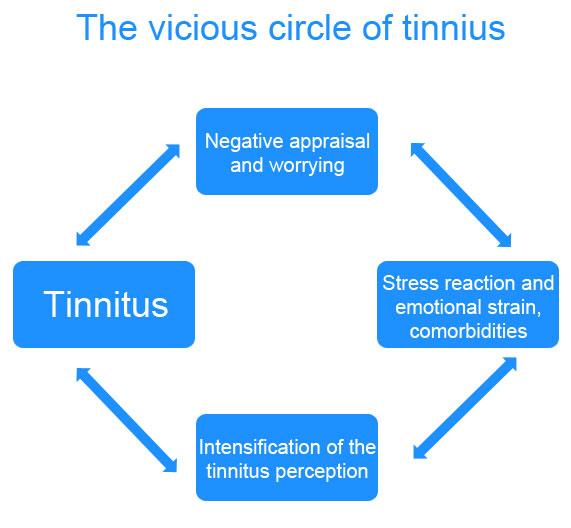Client Stress Series Part 1

In 2020, I think we all understand that our lives are influenced by stress. This could be work stress, financial stress, physical, mental… global pandemic… etc. but we all have some idea of what stress is and what that means for us.
Now add one more thing on top of your life stress: the stress of hearing loss and/or tinnitus. Both are not just an ear problem… they can create or add to the stress in your life.
In today’s world, we have a lot of stress in our lives. According to the American Psychology Association, 75% of adults experience moderate to high stress monthly and the amount of stress has increased in the last year alone. With this much stress flying around everywhere it’s important we understand what stress is, how it is affecting us; both physically and mentally, and how hearing loss and tinnitus increase and maintains heightened stress levels.
So what can we do? First, let’s take a look at what stress actually is.
What is Stress?
We all have some idea or definition we immediately think of for ‘stress’. It may be a feeling we associate with it, a situation, or a scientific definition. But what is stress really?
Stress is “the non-specific response [emotional or physical] of the body to a demand imposed on it”1. by strain or adverse circumstances. At its fundamental base, stress is an imbalance. Within our bodies, our systems are constantly trying to remain in homeostasis (balance). When things occur in our environment that increase the energy needed to accomplish a task, it changes how our body reacts. Chemicals in our brains change, our circulatory system may constrict, our heart rate and breathing increase, our digestive systems get put on pause, etc. All this internal change happens to provide more energy where it is needed.
Think of it this way, our bodies are like a thermostat. If we set our thermostat to 20 degrees, it will turn on the furnace when the temperature drops below 17 degrees. And will turn it off when the temperature rises above 22 degrees. Like a thermostat, our bodies are trying to keep a stable internal environment in our ‘homes’ using a baseline with some variability.
So stress or a stressor is anything that disrupts that internal balance causing us to burn energy to return to that baseline. These stressors can be a number of things: positive or negative stress, physical, emotional, internal, external, obvious or not so obvious, etc. Although what stressors we face changes over our lifespan, we all experience stress.

Hearing loss, Tinnitus, and Stress
So what do stress and hearing loss or tinnitus have to do with each other? And how does it affect me?
Hearing Loss
As mentioned above, hearing loss is more complicated than just not being able to hear; although that is where it starts. Our fundamental nature, as human beings, is to be in community with others. When anything interrupts that, like hearing loss, our ability to connect is put in danger. Being able to hear clearly, understand, or focus on the conversation affects every aspect of our lives, so when that is hindered you may begin to change the way you interact with the people in your life.
Some of the stresses of hearing loss:
- Straining to hear
- Feeling lost in conversation
- The embarrassment of responding incorrectly
- Frustrated by asking others to repeat
- Not confident going to certain environments (restaurants, groups, theatre, etc.)
- Family nagging you to get your hearing checked
- Social isolation
Tinnitus or ringing in the ears can occur along with hearing loss or without it. Something we know about tinnitus is it can be triggered by certain factors such as high levels of caffeine, alcohol, sugar, or salt, lack of sleep, and stress. These triggers can intensify the volume or intensity of the tinnitus. There are more triggers depending on the person, but these are ones commonly seen. While some of these can be controlled with diet others can be a bit more complex to reduce the effects of the trigger.
Why does stress increase tinnitus? Well, this can happen for a lot of reasons, but really it’s due to the circle of stress and tinnitus. You feel stressed for a variety of reasons, you lose sleep, blood pressure increases, appetite changes, all of which increases your tinnitus, which thus increases your stress… it can go on and on.

The stress associated with hearing loss and tinnitus is two-fold; it can inhibit your ability to connect with others and cause added stress in your life which creates, well, more stress. Stress is a vicious cycle that permeates every area of life. Life can improve when we address the stress and find ways to eliminate it or at least have strategies to bring down the stress.
Reducing Stress
Stress is more than just a thing we feel or have to deal with. It can cause a lot of harm to our bodies, our minds, and the relationships we have with those around us. Over the years, I’m sure you’ve found some kind of ‘stress management’ that has worked for a while. Unfortunately, as we move through life our stressors can change, meaning our strategies may not work in all situations for long periods of time. You wouldn’t go to the gym to help relieve the stress from hearing loss, even though it worked to reduce work stress. ‘Stress management’ is only a temporary solution.
We have to change our perspective on stress and how to handle it.
From what we’ve discovered about stress, we know it’s the extra use of energy that changes the workings of our bodies. Meaning, we need to find out how to re-energize ourselves in consistent ways. Additionally, we also have to find what is causing us stress in order to better understand how to change it.
In doing so, we can live calmer lives able to connect with those around us, do the things we want to do, and not let hearing loss, tinnitus, or stress get in our way.
Homework
Try to answer these questions:
- What do you know about stress?
- What stresses you out? Dig deep. Think about how you feel, emotions, how you want to react, the environment, etc.
- What things naturally make you feel calm?
- How does your hearing loss or tinnitus make you feel?
- What areas of your life has your hearing loss or tinnitus influenced?
Stay tuned for Part 2 of our stress series. In it, we will discuss a new perspective on stress and reducing it.
- Stress definition from the Mehrit Centre https://self-reg.ca/glossary/



Recent Comments